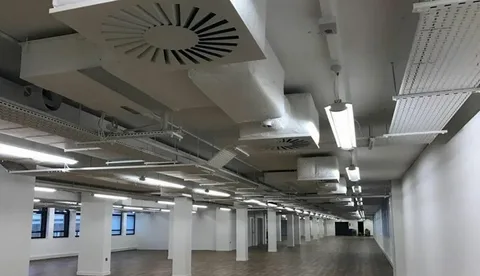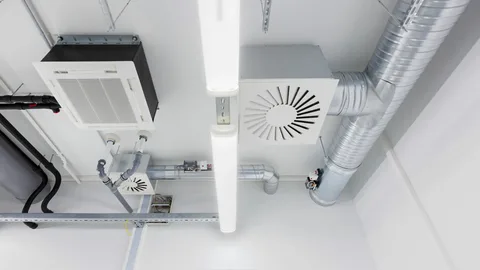Making sure your home is properly ventilated is essential for ensuring the health and safety of your family. A fresh air ventilation system is an efficient and effective way to ensure your home is filled with clean, healthy air. Installing one of these systems can provide you and your family with numerous benefits, which they’ll discuss in this blog post titled “Breathing Easy: The Benefits of Installing a Ventilation System”. From reducing allergies to boosting your energy levels, a ventilation system can make a big difference in the air quality of your home.
Fresh Air Ventilation Improving Indoor Air Quality
Breathing clean, fresh air ventilation is essential to our health and well-being, yet indoor air can be filled with pollutants and contaminants. A ventilation system can help improve indoor air quality by bringing in outside air and removing stale air from your home or workplace. A ventilation system helps remove indoor air pollutants such as dust, mold, and chemicals from cleaning products. It is especially important for those with allergies or respiratory conditions, as poor indoor air quality can exacerbate symptoms.
A ventilation system can help regulate humidity levels, which is important for preventing mold growth and maintaining a comfortable living environment. High humidity can also promote the growth of allergens and bacteria, so keeping it under control is crucial for a healthy indoor environment.
Inadequate ventilation can lead to a buildup of harmful chemicals and pollutants, so it’s important to have a steady flow of fresh air circulating throughout your home or workplace. It can help improve air quality, reduce odors, and prevent the spread of airborne illnesses.
Air Exchanger Reducing Health Risks By Decreasing Pollutants In The Air
Indoor air quality has become a growing concern over the years, with studies revealing that indoor air is often more polluted than outdoor air. Polluted air can lead to various health problems, including respiratory issues, allergies, and even cancer. Installing a ventilation system can greatly reduce these health risks by decreasing pollutants in the air. Air exchanger works by replacing stale indoor air with fresh outdoor air, diluting pollutants and allergens that may be present in the indoor air. These pollutants can include dust, smoke, and volatile organic compounds (VOCs) emitted by products such as cleaning agents, air fresheners, and paints. It helps to filter out these harmful particles and remove them from your home or workplace, keeping you and your loved ones safe and healthy.
A ventilation system also helps to control humidity levels, which can be a breeding ground for mold and bacteria. These microorganisms can also cause health problems, including allergies, respiratory issues, and even infections. The exchange system keeps humidity levels at an optimal range, preventing the growth of mold and other harmful bacteria.
Aside from improving air quality, ventilation systems also have the added benefit of enhancing energy efficiency. By improving airflow, air units help to maintain a comfortable indoor temperature while reducing the workload on your heating and cooling systems.
Air Exchange System Control Humidity For Comfort And Mold Prevention
Indoor air quality isn’t just about filtering out pollutants, it’s also about controlling the moisture content in the air. If the humidity level is too high, it can lead to mold growth, which is a serious health hazard. An air exchange system can help control the humidity level in your home or workplace, ensuring that it stays within a safe range.
Not only does this keep you and your family healthy, it also makes the environment more comfortable. High humidity levels can make you feel sticky and uncomfortable, while low levels can cause dry skin and respiratory problems. An air system can ensure that the humidity stays within a comfortable range, so you can breathe easily.
In addition, controlling humidity levels can help prevent damage to your property. Excess moisture can warp wood and damage paint and wallpaper, so it’s important to keep it under control. An exchange system can help prevent mold growth and other moisture-related damage, ensuring that your home or workplace stays in top condition.
Air Exchange Unit Enhancing Energy Efficiency By Improving Airflow
A properly functioning air exchange unit can have a significant impact on energy efficiency. By improving airflow, the system can help distribute heated or cooled air throughout the building more effectively. It can lead to lower energy consumption, which can result in cost savings for homeowners and businesses.
When airflow is obstructed or restricted, HVAC systems need to work harder to heat or cool the air. It can result in higher energy bills, reduced efficiency, and even premature equipment failure. An exchange unit can help by ensuring that fresh air is brought in and circulated properly, allowing the HVAC system to work more efficiently.
Furthermore, improved airflow can lead to better indoor air quality. By circulating air properly, pollutants, allergens, and other harmful particles can be filtered out more effectively. It can lead to a healthier environment for occupants and reduce the risk of respiratory problems.
Overall, an exchange unit is a valuable addition to any home or business, as it can lead to increased energy efficiency and better indoor air quality. It is important to choose a unit that is appropriately sized for the space it is intended for and to have it installed by a qualified professional to ensure optimal performance. By investing in a ventilation system, you can enjoy the many benefits of breathing clean, fresh air while saving money and energy in the process.
Fresh Air System For Home Minimizing Odors And Stale Air With Fresh Air Intake
Have you ever noticed that your home can sometimes feel stuffy or smell a little stale? This is a common problem, particularly in newer, more energy-efficient homes that are built to be airtight. While this is great for saving energy, it can be less than ideal for indoor air quality. One solution to this problem is to install a fresh air system for home. A ventilation system works by exchanging stale indoor air with fresh outdoor air, which can help to minimize odors and improve the overall air quality in your home.
With a fresh air intake, you can reduce the buildup of indoor pollutants such as dust, pet dander, and chemicals. These pollutants can be especially problematic for those with allergies or respiratory issues and can contribute to an overall feeling of discomfort and poor air quality.
In addition to reducing pollutants, a fresh air system can also help to control humidity levels in your home. Too much humidity can lead to mold growth and other moisture-related problems, while too little can lead to dry skin and other respiratory issues. By exchanging indoor air with fresh outdoor air, a ventilation system can help to regulate these levels and maintain a healthy indoor environment.
Supporting Productivity And Mental Focus In Workplaces And Schools
We all know how important it is to be able to focus on tasks at work or school. Unfortunately, when we’re surrounded by stale, stagnant air, our minds can start to feel sluggish and tired. It is where a ventilation system comes in.
Studies have shown that proper ventilation can help to improve productivity and mental focus in workplaces and schools. When the air is clean and fresh, it allows our brains to function at their highest level, which can lead to better problem-solving skills, greater creativity, and improved memory.
In addition, when the air quality is poor, it can lead to health issues that can affect productivity. For example, people who suffer from allergies or asthma may struggle to concentrate if they’re constantly coughing or sneezing. The ventilation systems help to reduce these issues by filtering out pollutants and allergens from the air. Furthermore, by controlling the humidity levels in a space, a ventilation system can also help to prevent mold growth. Mold can be harmful to health and lead to respiratory issues and headaches, which can certainly impact focus and productivity.
Reducing Carbon Dioxide Buildup And Its Negative Effects
It’s no secret that carbon dioxide is an important component of our atmosphere, but too much of it in indoor spaces can lead to some serious health concerns. It is where a ventilation system comes into play.
When a building lacks proper ventilation, carbon dioxide levels can quickly rise and lead to a variety of negative effects. These include headaches, fatigue, and even respiratory problems. Poor indoor air quality has also been linked to a decrease in cognitive function and decision-making abilities.
By installing a ventilation system that brings in fresh air, you can significantly reduce carbon dioxide buildup and its negative effects. A proper ventilation system will continually exchange stale indoor air with fresh outdoor air, maintaining a healthy balance.
Additionally, reducing carbon dioxide levels with a ventilation system can help minimize the presence of other indoor air pollutants, such as volatile organic compounds (VOCs). These pollutants can come from a variety of sources, including cleaning products, paint, and furniture. By reducing these pollutants and their sources, you can create a healthier living or working environment.



